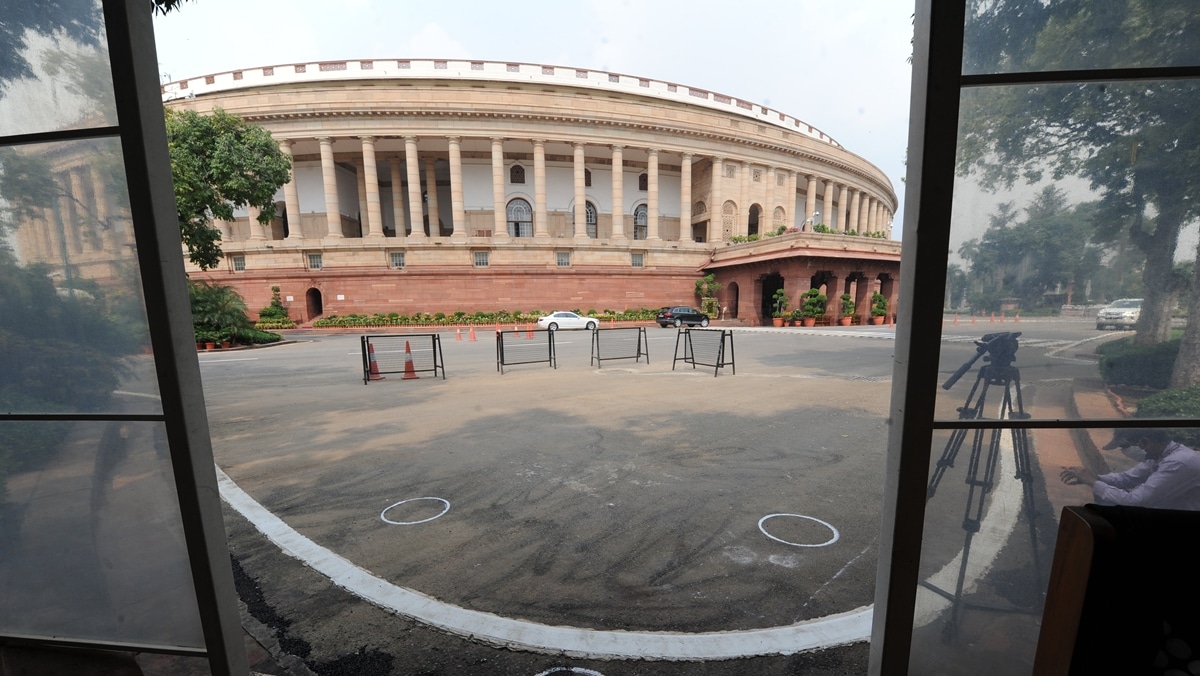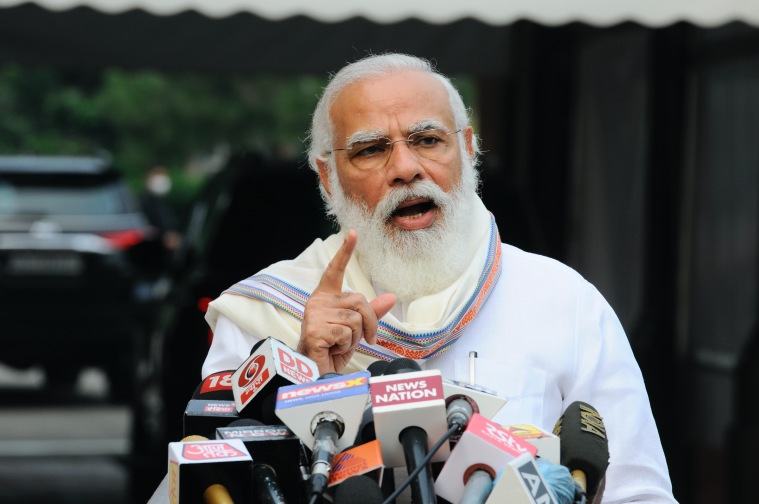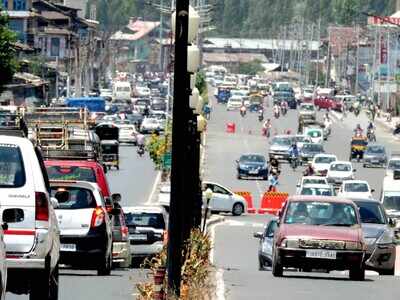NEW DELHI: Amid a spurt in Covid-19 cases, the government on Tuesday said India learnt from the experience of nations that suffered high mortality and was able to "distribute the curve" of the
coronavirus infection due to a "very effective" lockdown and avoid the "huge peak" those countries had in terms of deaths. At a press briefing, Director General of the Indian Council of Medical Research (ICMR), Dr Balram Bhargava, also said reinfection was "very, very rare" with Covid-19, but it can happen.
Bhargava, however, said it was not a matter of serious concern.
The government also asserted that there is absolutely "no shortage" of medical oxygen, vital in the treatment of coronavirus patients, at the national level, while urging states to ensure a proper inventory management at hospital-level and advance planning for timely replenishment so that there is no stockout.
Asserting that India has one of the largest number of Covid-19 recoveries, Union Health Secretary Rajesh Bhushan said there are 14 states and union territories (UTs) in the country where the number of active cases are less than 5,000.
Bhushan said there are 18 states and UTs in the country where the total number of active cases are between 5,000 and 50,000, while there are only four states with more than 50,000 active cases.
"India's Covid-19 recoveries have surged to more than 38.59 lakh, which is one of the highest in the world. According to the Johns Hopkins University Coronavirus Resource Center, this is the highest number of recoveries in the world," he said.
India's Covid-19 caseload sprinted past 49 lakh with 83,809 people testing positive in a day, while 38,59,399 people have recuperated so far taking the national recovery rate to 78.28 per cent on Tuesday, according to the Union Health Ministry data. The total number of coronavirus cases mounted to 49,30,236, while the death toll climbed to 80,776 with 1,054 people succumbing to the disease in a span of 24 hours, the official data showed.
Talking about India's Covid-19 fight, Bhargava said, "If you look at the countries of Europe and the United States, they had a peak and then they came down and during that peak whether it was Spain, the UK or Sweden or Italy, there were huge number of mortalities. Then there was a peak which came down and then they had a second wave which is recently occurring in those countries."
"Fortunately, we took learnings from that in India and we were able to, what we call, 'distribute the curve'. We distributed the curve in such a way that we did not have those large number of deaths and that was attributable scientifically because of a very effective lockdown that was imposed in the months late March, April and May. So, we did not really have a huge peak from that perspective," he said.
The National Task Force on Covid-19 and the joint monitoring group (JMG) in the Union Health Ministry will take a decision on whether to continue plasma therapy in the treatment of Covid-19 patients in India after reviewing data of its randomised controlled trial, Bhargava said.
Asserting that there has been a progressive rise in India's Covid-19 testing, Health Secretary Bhushan said, "We took 27 days to double our testing from 1 crore to 2 crore. However, we took only 10 days to jump from 4 crore tests to 5 crore tests."
More than 5.8 crore tests have been conducted so far, out of which, more than 76 lakh tests were conducted in the last week.
"The number of tests that a state or UT conducts has to be seen in tandem with the rate of positivity reported by them. Because test numbers on its own would not give any significant input to us. If in spite of a large number of tests being conducted, if the positivity remains high the state or UT needs to ramp up the testing further," Bhushan underlined.
In this context, he said
Maharashtra has a positivity rate of 21.5 per cent and hence, requires to increase testing.
Similarly, states like
Karnataka and
Andhra Pradesh which have a positivity rate of above 12 per cent will have to further ramp up their testing.
The health secretary stressed that states should aspire to keep their positivity rate below the national average of 8.4 per cent. Presently, active cases of the infection (9,90,061) are only one-fifth of the total Covid-19 cases so far, he said.
Five states --Maharashtra (29.5%), Karnataka (9.9%), Andhra Pradesh (9.4%), Uttar Pradesh (6.8%) and
Tamil Nadu (4.7%)- account for 60 per cent of the total active cases in the country, Bhushan said.
He presented a graph showing the daily average of new cases on a week-on-week basis, starting from first week of July in the top five states of Maharashtra, Karnataka, Uttar Pradesh, Andhra Pradesh and Tamil Nadu.
The graph shows an increasing trend of cases in Maharashtra, while stabilization is observed over the last three weeks in Karnataka, he stated.
Again, the graph of Uttar Pradesh shows a rising trend, while stabilization over the last three weeks is also observed in Andhra Pradesh and Tamil Nadu shows initial signs of decline in the number of cases, Bhushan highlighted.
A rising trend of deaths is also observed in Uttar Pradesh, while Andhra Pradesh is showing early signs of decline over the last three weeks and Tamil Nadu is showing signs of decline over the last four weeks, he said.
India's cases per million population at 3,573 is amongst the lowest in the world, while the global average is 3,704, Bhushan said.
He also underlined that India's Covid-19 deaths per million population at 58 is also amongst the lowest in the world, against global average of 118. While addressing a query on sero-survey, Bhargava stated, the national sero-survey, which was done in April-May and is being repeated after three months, has been completed in 68 out of 70 districts.
After analysis of the results by this month end, the two studies can be compared. He added that sero-survey also brings out infection fatality rate, which was found to be between 0.5-0.6 in the last national sero-survey, which was much below that in many other countries.
 Markings to maintain physical distancing are seen on the ground outside Parliament building in New Delhi. (AP)
Markings to maintain physical distancing are seen on the ground outside Parliament building in New Delhi. (AP) Prime Minister Narendra Modi addresses media as he arrives at Parliament in New Delhi (AP)
Prime Minister Narendra Modi addresses media as he arrives at Parliament in New Delhi (AP)

The government prevented 14-29 lakh coronavirus cases and 37,000-78,000 deaths due to the disease by imposing the nationwide lockdown that was announced on March 24, the Lok Sabha was informed on Tuesday.
Union Minister of State for Home Nityanand Rai said the World Health Organisation (WHO) has observed, with regard to the lockdown measures taken by the government, that India's response to COVID-19 has been pre-emptive, pro-active and graded with high-level political commitment and a "whole government" approach to respond to the pandemic.
Rai said by imposing the countrywide lockdown, India successfully blunted the aggressive spread of COVID-19.
"It has been estimated that the decision of lockdown, by slowing down the progress of pandemic in India, has prevented 14-29 lakh cases and 37,000-78,000 deaths," he said in reply to a written question. (PTI)
Calling her the brave daughter of Himachal Pradesh, BJP MP from Mandi, Ram Swaroop Sharma, condemned the demolition of office of actor Kangana Ranaut in Mumbai, and told the Lok Sabha that Shiv Sena, which was formed on the ideals of Chhatrapati Shivaji Maharaj, has become "Congress Sena".
Lok Sabha passes Salary, Allowances and Pension of Members of Parliament (Amendment) Bill, 2020.
Union Minister of State for Home G Kishan Reddy said the government of Jammu and Kashmir has reported that after the abrogation of Article 370 in August last year various measures were taken to maintain public order which included preventive detention of certain persons.
"As on September 11, 2020, 223 persons are under detention. No person is under house arrest in the UT of Jammu and Kashmir," he said in a written reply to a question in Lok Sabha.
Reddy also said after the bifurcation of the erstwhile state of Jammu and Kashmir on August 5, 2019, the number of terrorist incidents have reduced significantly. (PTI)
Lockdown from March 25 to May 31 successfully controlled aggressive progression of COVID-19 in India but there has been steady rise in number of cases in post-lockdown phase: Minister of State for Health and Family Welfare Ashwini Choubey tells Rajya Sabha
Congress MPs protesting in front the Mahatma Gandhi statue after they walked out of Lok Sabha. Congress MPs demanded a discussion on India-China border issue after Defence Minister Rajnath Singh's address.
After Rajnath Singh finished his address in Lok Sabha, Congress MPs staged a walkout from the lower house, demanding discussion on India-China border issue.
Defence Minister Rajnath Singh: "I want to assure that the morale of our armed forces is high. No one should doubt it. PM's visit to Ladakh has sent a message that people of India stand behind Indian armed forces."
"The Chinese side created a violent face-off on June 15th at Galwan. Our brave soldiers laid down their lives and also inflicted costs including casualties on the Chinese side."
"In past too, we've had situations of prolonged stand-offs in border areas with China which were resolved peacefully. Even though situation this year is very different both in terms of scale of troops involved&number of friction points, we remain committed to peaceful resolution."
"I request this house to pass a resolution that we stand shoulder to shoulder with our armed forces who are guarding our borders to safeguard India's sovereignty and integrity."
Defence Minister Rajnath Singh: "In meeting with Chinese Defence Minister, I clearly stated that while our troops had always taken a responsible approach towards border management, but at same time there should be no doubt about our determination to protect India’s sovereignty and territorial integrity."
Defence Minister Rajanth Singh: "There was a face-off in Galwan on June 15 in which Indian forces inflicted heavy casualties on Chinese forces."
"I want to assure you that we are ready to deal with any situation," he added.
Defence Minister Rajnath Singh in Lok Sabha: "Violent conduct of Chinese troops is a violation of all past agreements. Our troops have done counter deployments in the area to safeguard our borders."
"China has mobilised a huge number of Army battalions and armaments along LAC and inner areas. There are many friction points in eastern Ladakh, Gogra, Kongka La, Pangong Lake's north and south banks. Indian Army has made counter deployments in these areas."
Defence Minister Rajnath Singh in Lok Sabha: "China doesn't recognise the traditional and customary alignment of the boundary. We consider that this alignment is based on well established geographical principals."
"We have told China through diplomatic channels that the attempts to unilaterally alter the status quo were in violation of the bilateral agreements."
Rajnath Singh on border row with China: "Both India and China agree that to maintain peace and tranquillity in the India-China border areas, it is essential for the further development of bilateral relations: Defence Minister Rajnath Singh on India-China border issue."
"India and China border issue remains unresolved. Till now, there has been no mutually acceptable solution. China disagrees on border: Defence Minister Rajnath Singh in Lok Sabha."
At least 10 notices have been given for adjourning the proceedings to discuss “crucial issues”. This includes the Indian Express report on hybrid warfare by China. Congress leaders Adhir Ranjan Chowdhury, K Suresh, and Manick Tagore have given separate notices to take up the issue of China surveillance in Lok Sabha. Congress MP Hibi Eden wants the house to discuss the government’s move to suspend MPLADS funds. Congress MP T N Pratapan, CPI-M’s A M Arif RSP’s NK Premachandran, and IUML’s Mohammad Basheer have given notices to discuss the Delhi police chargesheet against social and political leaders. K Muraleedharan of the Congress wants the house to discuss GDP decline suspending all other business
Bills for consideration and passing
Rajya Sabha has been adjourned and will resume at 9 am tomorrow. Defence Minister Rajnath Singh will address Parliament on the India-China border row in Lok Sabha. The minister’s address is expected to take place around 3 pm — at the beginning of the proceedings in the Lok Sabha.
Vice President Naidu asked if a short duration discussion on the pandemic can be taken up tomorrow. House agrees. Discussion will be held tomorrow.
"COVID-19 testing is about 1 million tests per day which translates to 720 tests per million population per day, much higher than that stipulated by WHO which 140 tests per million per day. A total of 55189226 samples were tested as of Sept 11. I want to remind the members that battle against COVID-19 is far from over. I wish to inform the house that government is taking all necessary measures to prevent the spread of COVID-19 in India," Dr Harsh Vardhan said.
The discussion in Rajya Sabha has now switched to coronavirus pandemic. Addressing Rajya Sabha, Dr Harsh Vardhan said, "COVID-19 fatality and recovery rates stand at 1.67% & 77.65% respectively. India has been able to limit its cases & death per million to 3,320 cases per million and 55 deaths per million which is one of the lowest in the world. Lockdown prevented approximately 14 lakh to 29 lakh cases & 37,000 to 78,000 deaths. These 4 months were utilised to created additional health infrastructure, enhance human resource & produce within Indian critical elements such as PPE kits, N95 masks&ventilators."
"A lot is being made out about six airports. Mumbai & Delhi, 2 airports privatised in 2006, account for 33% of our traffic & earning. The six airports that were awarded in 2018 together account for only 9%. When Delhi and Mumbai airports were privatised in 2006, all subsequent efforts and privatisation contained a stipulation to the effect that prior experience was necessary so we fell into a trap of our making," Civil Aviation Minister Dr Hardeep Puri said, as Rajya Sabha passed Airport (Amendment) Bill